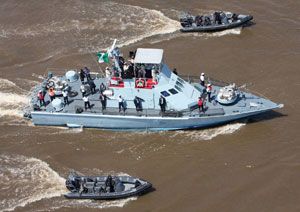Serious Flaws in Security as Nigerian Factions Squabble Over Primacy
NIGERIA – The situation with regard to piracy, hijackings and theft of all types from freight and passenger vessels and particularly those concerned with energy extraction, transiting the waters off the country’s coast is already dangerous and confused enough without an element of political infighting and the confusion which has arisen when personnel from different branches of local law enforcement have clashed over who has primacy on the open sea. Last October a skiff approaching a Romanian owned oil tanker was fired on by the Nigerian police security team aboard which believed it to be manned by a pirate group. The boat actually contained a Nigerian Naval patrol which drove the shooters into the vessel’s citadel from which they were later extracted and arrested.
This is just one of many similar incidents which have arisen as confusion over where geographical jurisdiction starts and finishes is made more difficult by ‘private’ security escort arrangements with officials made by shady middle men. Certainly the Nigerian Navy seemingly has charge of matters in the Exclusive Economic Zone (EEZ) an area extending up to 200 nautical miles seawards from the coasts of Nigeria within which the country’s authorities reserve the right to regulate by law any and all actions which they see fit.
The problem is, which authorities? The Navy also has powers extending to inshore waters when acting as part of the Niger Delta Joint Task Force whilst the Nigerian Maritime Safety Agency (NIMASA), also seems to claim some interest in anything occurring within the EEZ.
NIMASA is run by Mr. Ziakede P. Akpobolokemi, whose current agency is allegedly linked to Government Ekpemupolo, poacher turned gamekeeper and the billionaire who was formerly a commander (and alleged military quartermaster) of the Movement for the Emancipation of the Niger Delta (MEND) who now, after receiving amnesty five years ago, is alleged to be the power behind Global West Vessel Specialist Ltd. which offers security surveillance in the EEZ acting for NIMASA.
NIMASA in turn is linked to the Nigerian Ports Authority (NPA) which says it collaborates closely with other government security agencies, namely the Marine Police and the Nigerian Navy, to regularly patrol and provide air surveillance for water fronts and river channels to battle the menace of piracy in and around the country’s ports. In addition, the port management department says it provides high speed patrol boats to assist the ‘security agencies’ in their patrols and surveillance.
It seems ‘arrangements’ have been made with all and sundry to protect private shipping, a job many have proved woefully inadequate at, with Nigerian Maritime Police being hired out under ‘private’ contracts only to be subsequently arrested and detained by the Navy which has been charged by new leadership to clean up the whole scene.
One of the groups most affected by the disastrous security situation in the region are the members of the Baltic and International Maritime Council (BIMCO) which is currently seeking written confirmation from the Nigerian authorities of how it sees the situation. The BIMCO view is explained fully in a recent statement to its members which reads:
“BIMCO members operating vessels within the Nigerian EEZ and territorial waters should be aware that they may be at risk of potentially significant liabilities and delays if they employ armed guards on board their vessels who are sourced from the Nigerian Marine Police, the Nigerian Police or the Joint Task Force (JTF). The Nigerian Navy only provides vessel escorts and it is understood to have sole primacy and authority in territorial waters and the EEZ, BIMCO has been advised that the Nigerian Navy does not provide or permit armed guards on merchant vessels.
“The Navy has seemingly begun enforcing its alleged authority to prevent the employment of armed guards on board and this has resulted in the arrest of members of the Nigerian Marine Police and consequent delays to the vessel and unresolved liabilities placed on the owners. This appears to apply regardless of whether the armed guard policemen are sourced by an agent or a private military security company (PMSC).
“There have also been reports of incidents of ‘blue on blue’ where policemen have opened fire on Nigerian Naval vessels believing they were pirates and where seafarers have been killed or injured in the crossfire. Apparently, the Marine Police and Police only have primacy and jurisdiction in ‘riverine’ areas and ports and harbours out to the fairway buoy and no further.
“The JTF against terrorists, is a combined task force of navy and police, with a specific role to counter oil theft and smuggling in the Delta. The JTF is understood to have no jurisdiction outside this remit. The transit of supply vessels up the Bonny River to Port Harcourt is arranged by the JTF and these ships go in convoys (for a charge) whilst the offshore oil export Terminals are patrolled by private security units or the Nigerian Navy.
“It would seem that the only legitimate method of acquiring armed security protection in territorial waters and the EEZ of Nigeria is by utilising the services of the Nigerian Navy (although, this seems to exclude armed guards on board vessels).”
Sourced – /www.handyshippingguide.com/
